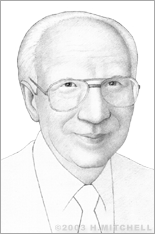Willem Kolff
Willem Kolff, creator of the first kidney dialysis machine, was born on February 14, 1911 in Leyden, Holland. He became interested in medicine as a child, spending a great deal of time learning from his father, Jacob Kolff, who was the director of the Tuberculosis Sanatorium at Beekbergen. Kolff graduated from the Leyden Medical School in 1938, and in 1941, he received a PhD and graduated summa cum laude from the University of Groeningen.
As a medical student, Kolff had witnessed a 22-year-old man’s death due to kidney failure. He immediately devoted himself to research. In 1941, he developed an artificial kidney machine in Kampen, Germany. He had obtained coarse materials from a local factory, fashioning a machine out of cellophane tubing wrapped around a cylinder, which would rest in a bath of cleansing fluid. The patient’s blood, which was toxic because of the kidney failure, would be drawn into the tubing, into the bath, and cleaned, then passed back into the patient’s body. In 1945, the device saved the life of its first patient, a 67-year-old woman. She lived for seven more years.
In 1950, Kolff immigrated to the United States, taking a position at the Cleveland Clinic Foundation as the Head of the Department of Artificial Organs and Professor of Clinical Investigation. At the Cleveland Clinic, Kolff began working on an artificial heart. In 1957, an artificial heart was implanted into an animal for the first time.
In 1967, Kolff left Cleveland to take a position at the University of Utah as the Director of the Institute for Biomedical Engineering and its artificial organs division. He continued his work on the artificial heart there, and in 1982, he supervised the first full implant of an artificial heart in a human patient. That patient was Barney Clark.
At the University of Utah, Kolff led or contributed to the efforts related to many other types of artificial organs as well, including artificial ears, electronic artificial eyes, and a membrane oxygenator. His most renowned creation incorporates the original idea of hemodialysis and currently keeps more than one million patients alive worldwide. Today, hemodialysis is available in nearly every country in the world.
Kolff had been honored with many awards including the Amory Prize, the Valentine Award, the Cameron Prize for Practical Therapeutics by the University of Edinburgh, the Lasker Clinical Award, and induction into the National Inventors’ Hall of Fame. He published many medical articles in more than 300 scientific journals.
He passed away on February 11, 2009.


